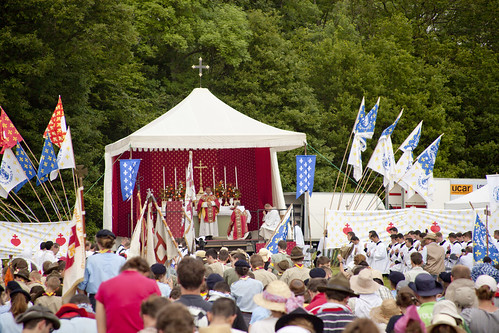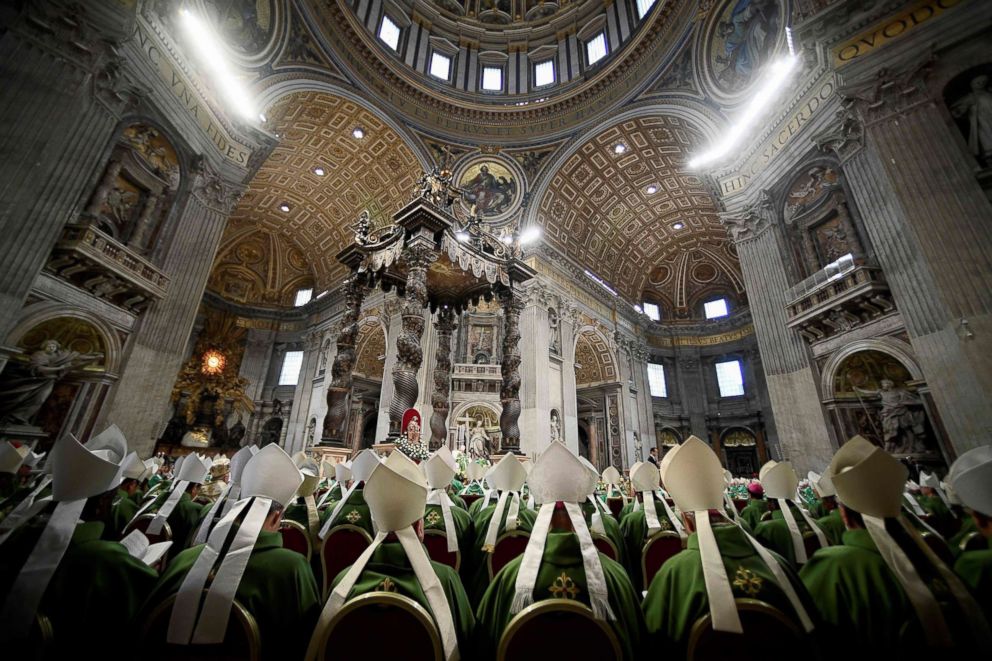The two synods on the family of 2014 and 2015 were among the most deliberately steered in history, so much so that at the beginning of the second session thirteen top-ranking cardinals wrote a
letter to Pope Francis precisely to denounce the maneuvers aimed at producing “predetermined results on important disputed questions.”
The point being that the outcome of that double synod was already decided even before it was celebrated. And its coronation was the post-synodal exhortation “Amoris Laetitia,” with which Francis gave the go-ahead to communion for the divorced and remarried, in spite of the fact that a good one-third of the synod fathers had spoken out against it.
Instead, the synod on young people that will conclude on Sunday, October 28 seems to be the most peaceful ever.
So peaceful that even the most explosive argument of those put to discussion - concerning the judgment on homosexuality - was practically defused.
The discussions in the assembly were kept confidential. But according to what was made public by the official information sources, there was not even one statement in favor of a change in Catholic doctrine on homosexuality.
And yet the “
Instrumentum Laboris,” meaning the starter document that the synod fathers were called to discuss, seemed to promise sparks when it stated in paragraph 197 (among other things, introducing for the first time into an official text of the Church the not-innocent acronym LGBT):
“Some LGBT youths, through various contributions that were received by the General Secretariat of the Synod, wish to ‘benefit from greater closeness’ and experience greater care by the Church, while some BC ask themselves what to suggest ‘to young people who decide to create homosexual instead of heterosexual couples and, above all, would like to be close to the Church’.”
And instead nothing. When it came time to discuss this paragraph in the third week of the synod, not even those synod fathers known as innovators came out into the open.
On the contrary, in reading the few lines dedicated to the topic by what was expected to be of the 14 “
circuli minores” the one most inclined to innovate, “Anglicus B” headed by Cardinal Blase J. Cupich, one is struck by its explicit reference to the traditional doctrine on homosexuality contained in the
Catechism.
Here, in fact, is how the relator of “Anglicus B” summed up the overall perspective of his working group, in the “relatio” presented in the assembly on October 20, concerning young people “who experience same-sex attraction:”
“We propose a separate section for this issue and that the main objective of this be the pastoral accompaniment of these people which follows the lines of the relevant section of the Catechism in the Catholic Church.”
So without changing a comma of the Catechism, which on homosexuals, in paragraphs 2357-59, says that “they must be accepted with respect, compassion, and sensitivity,” but also that they “are called to chastity,” because their “inclination” is “objectively disordered.”
Other “circuli minores” also discussed the question, but always insisting - according to their written accounts - on the goodness of the Church’s traditional vision and on the need for the “conversion” of homosexuals to a chaste life.
With these premises, it therefore appears unlikely that the final document of the synod, which has been under discussion since October 23 and will come to the final vote on Saturday the 27th, would mark a turning point on the issue of homosexuality.
But precisely because the ones who hit the brakes included the synod fathers closest to Jorge Mario Bergoglio, it is plausible that this de facto flop was not a failure of the pope’s expectations, but on the contrary was the fruit of his decision.
A decision that was probably made while the work was underway, considering the dramatic moment that the Catholic Church and the papacy itself are going through on the world stage, in the thick of a cataclysm that has its peak precisely in the disordered homosexual activities of numerous sacred ministers.
By
statute, a pope never intervenes in the drafting of the final document, which instead must be “offered” to him at the end of the synod.
But this time Francis has bent the rules, in order to follow the composition of the text as closely as possible. This was revealed by “
L’Osservatore Romano” in the edition that went to press in the early afternoon of Tuesday, October 23, where it says that in the work of composing the document “on Monday evening Pope Francis also took part in person.”
At a press conference, on October 23, to the question of whether the final document, like the “Instrumentum Laboris” before it, will contain a passage concerning “LGBT young people,” Filipino cardinal Luis Antonio Tagle - a leading figure of the Bergoglian circle - replied that “the issue will be present in the document, in what form and with what approach I do not know,” implying in any case that there will be no repetition of the acronym LGBT, which had raised so many protests even before the beginning of the synod.
Tagle gave another response in line with tradition also to the question of what to do concerning the widespread presence in seminaries of young homosexual candidates for the priesthood. He said that albeit “with constant respect for human dignity, there are also several needs and requirements that we must consider,” so that they may not be “in contradiction with the exercise of a ministry.”
And at a press conference the following day German cardinal Reinhard Marx - another leader of the progressive wing and a “heavy” member of the “C9,” the council of cardinals that assists Francis in the governance of the universal Church - put the last nail in the coffin. “The question of homosexuality was never among the central topics of the synod,” he said. And he strictly ruled it out that the acronym LGBT would be used in the final document: “We must not allow ourselves to be influenced by ideological pressure, nor to use formulas that can be exploited.”













